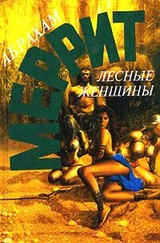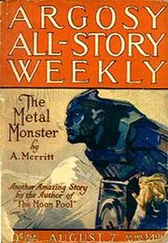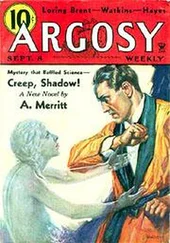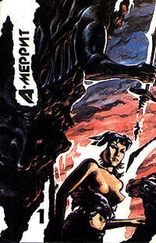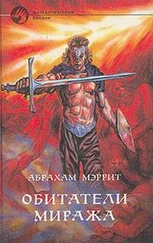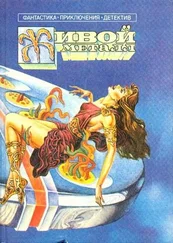"I will not die until I see your face, O Ishtar!" he cried—and so crying tore the veils away…
Kenton looked upon the face of Sharane.
But not the Sharane of the ship—vital, filled with the fire of life.
Here was a Sharane of wide, unseeing eyes; upon whose white brows dream sat throned; a mind that floated through linked labyrinths of illusion.
The Priest of Bel's voice shrilled:
"Slay that man!"
The swords of the two captains bit through the youth's breast.
He fell, still holding tight the veils. Sharane looked down upon him, unconcerned.
"Ishtar!" he gasped. "I have seen you—Ishtar!"
His eyes glazed. Sharane tore the veils from his stiffening hands; threw the tattered remnants over her face. She swept on to the temple—was gone from Kenton's straining sight.
From the multitude a clamor arose. Archers and spearmen began to push back the throng through the forest of the slender, lacquered pillars; sifted among them; vanished with those they herded. Past the Priest of Bel went his soldiers and acolytes; and after them slipped the harpers, the pipers and the drum girls of Narada.
Within that vast court circled by the elfin shafts remained only dancer and priest. The lurid sky darkened steadily. The slow, churning movement of the clouds had become more rapid. The lanced flame on the altar of Bel shone brighter—angrily; like a lifted, scarlet sword. Around the crouching Kerubs the shadows thickened. The metallic thundering had become continuous, marching closer.
With the passing of Sharane, Kenton would have opened that other door of bronze. Something counselled him that the time had not yet come; that a little longer he must wait. And as he waited dancer and priest drifted to that strange window through which he peered.
Close to him they paused.
"BEL should be pleased with his worship, priest!" Kenton heard the dancer say.
The priest asked, dully: "What do you mean?"
Narada drew closer to him; her hands fluttered out to him.
"Shalamu," she whispered. "Did I dance for the god? You know I danced for—you. And whom did you worship, Shalamu? The god? No—the priestess. And whom, think you, did she worship?"
"She worshipped Bel! Our Lord Bel who has—all," the priest answered, bitterly.
Said the dancer, mockingly: "She worshipped herself, Shalamu!"
He repeated, stubbornly, wearily: "She worshipped Bel."
Closer came Narada, touched him with fluttering, yearning hands.
"Does any woman worship a god, Shalamu?" she asked. "Ah—no! I am a woman—and I know. This priestess would be a god's woman—no man's. She holds herself too high, too precious, for man. She loves herself. She worships herself. She would bow down to herself as a god's woman. Women make gods of men and then love them. But no woman loves any god she has not made, Shalamu!"
The priest said, sullenly: "Well—I worshipped her!"
The dancer said: "As she worshipped—herself! Shalamu—does she long to give joy to Bel? To our Lord Bel who has Ishtar? Can we give joy to the gods—to the gods who have all? The lotus rises to the sun—but is it to give joy to the sun that she rises? No! It is to give joy to herself. So the priestess! I am a woman—and I know."
Her hands were on his shoulders; he took them in his own: "Why do you say these things to me?"
"Shalamu!" she murmured. "Look in my eyes. Look on my mouth—my breasts. Like the priestess I am the god's, But I give myself to you—beloved!"
He said, dreamily: "Yea—you are beautiful!"
Her arms were round his neck, her lips close to his.
"Do I love the god?" she whispered. "When I dance is it to delight his eyes? It is for you I dance—beloved. It is for you I dare Bel's wrath—" Softly she drew his head down on her breast—"Am I not fair? Fairer than this priestess who is Bel's and worships herself nor will ever give herself to you? Are not my perfumes pleasing? No god possesses me—beloved!"
Dreamily he answered her again: "Yea—you are very fair."
"I love you—Shalamu!"
He thrust her from him: "Her eyes are like the Pools of Peace in the Valley of Forgetfulness! When she comes near me the doves of Ishtar beat their wings above my head! She walks upon my heart!"
Narada drew back, scarlet lips pale, brows a menacing straight line:
"The priestess?"
"The priestess," he answered. "Her hair is like the cloud that veils the sun at dusk. The wave of her robe scorches me as the wind from the desert noon scorches the palm The wave of her robe makes me cold as the wind of the desert night makes cold the palm."
She said:
"That youth was bolder far than you, Shalamu."
Kenton saw the red rush through the priest's face.
"What do you mean?" he snarled.
"Why did you have the youth slain?" coldly as before come her voice.
He answered, hotly: "He did sacrilege. He—"
She stopped him, contemptuously: "Because he was bolder than you. Because he dared to tear the veils from her. Because you knew yourself the coward. This is why you had him slain!"
His hands twitched to her throat: "You lie! You lie! I would dare!"
Again she laughed; "You did not even dare to slay him—yourself!"
His hands were at her throat; she thrust them carelessly aside.
"Coward!" she said. "He dared to lift the veil from what he loved. He dared the wrath both of Ishtar and of Bel!"
The priest cried brokenly: "Would I not dare? Do I fear death? Do I fear Bel?"
Her eyes mocked him.
"Hai! You love so greatly!" she taunted. "The priestess awaits the god—in his lonely house! Perhaps he is not in the storm! Perchance he tarries with another maid—Oh, fearless one! Bold lover—take his place!"
He shrank back from her.
"Take—his—place!" he whispered.
"You know where the armor of the god is hidden. Go to her as the god!" she said.
For a long moment the priest stood, quivering. Then Kenton saw irresolution fly; decision take its place. He strode to the altar—down went the lanced flame; wavered; died. In the sudden dark the crouching Kerubs seemed monstrously to take wing.
There came a flash of the weird lightning,
By its irised flare he saw the Priest of Bel passing swiftly along that way Sharane had come and gone; saw Narada lying huddled in her nets of jet, the sipping flocks of golden butterflies at rest upon her; heard a low, heartbroken wailing.
Slowly Kenton's hand began to slip from the lever. Now was the time to use that key, pass on where the blue priest had pointed. His hand froze upon the lever.
A shadow, blacker than the dusk without, had passed the window; stood over the dancer; a huge and unwieldy bulk—familiar,
Klaneth!
"Good!" rumbled the black priest, and touched her with his foot. "Now soon neither he nor Sharane shall trouble you more. And you have well earned that reward I promised you."
Narada looked up at him with white and piteous face, stretched shaking hands out to him.
"If he had loved me," she wailed, "never would he have gone. If he had loved me but a little—never would I have let him go. But he angered me—he shamed me, throwing back to me the love I offered him. Not for you, black snake, despite our bargain, did I send him to her—and to death!"
The black priest stared at her, then laughed.
"Whatever your reason—you sent him," he said. "And Klaneth pays his debts."
He dropped a handful of flashing jewels into her outstretched palms. She screamed, opened fingers as though the gems burned her; they fell and rolled about the chequered stones.
"If he had loved me! If he had loved me but a little!" sobbed Narada—and crouched again, a huddled heap, among her butterflies.
Читать дальше

![Абрахам Меррит - Лунный бассейн [Лунная заводь]](/books/20623/abraham-merrit-lunnyj-bassejn-lunnaya-zavod-thumb.webp)
